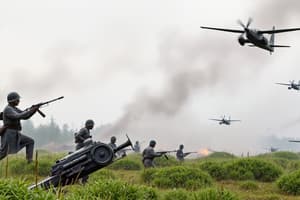Podcast
Questions and Answers
When did Germany invade Poland to start World War II?
When did Germany invade Poland to start World War II?
- September 1, 1939 (correct)
- July 20, 1944
- August 15, 1945
- June 6, 1944
What was the primary objective of Operation Barbarossa?
What was the primary objective of Operation Barbarossa?
- Invade and conquer the Soviet Union (correct)
- Invade the United Kingdom
- Conquer France
- Conquer Italy
Which battle marked the largest tank battle in history during World War II?
Which battle marked the largest tank battle in history during World War II?
- Battle of Moscow
- Battle of Stalingrad
- Battle of Kursk (correct)
- Battle of Berlin
What were some key outcomes of World War II?
What were some key outcomes of World War II?
Why did the Operation Barbarossa campaign fail?
Why did the Operation Barbarossa campaign fail?
What was a significant impact of World War II on global diplomacy?
What was a significant impact of World War II on global diplomacy?
What event marked the start of World War II?
What event marked the start of World War II?
Which of the following countries was not part of the Axis powers during World War II?
Which of the following countries was not part of the Axis powers during World War II?
What event is considered the turning point of World War II?
What event is considered the turning point of World War II?
Which of the following countries was not involved in World War II during its early stages?
Which of the following countries was not involved in World War II during its early stages?
What event prompted the entry of the United States into World War II?
What event prompted the entry of the United States into World War II?
Which of the following was not a contributing factor to the gradual defeat of the Axis powers?
Which of the following was not a contributing factor to the gradual defeat of the Axis powers?
Flashcards are hidden until you start studying
Study Notes
Introduction
World War II was one of the most significant global conflicts in human history, spanning six years from 1939 to 1945. This period witnessed some of the most devastating events in European and Asian nations, including Germany's invasion of Poland, the Holocaust, the bombings of Hiroshima and Nagasaki, and the eventual entry of the United States into the war following the attack on Pearl Harbor. This article explores the historical context of World War II and delves deeper into the subtopic of world wars.
Historical Context of World War II
The start of World War II was marked by Germany's invasion of Poland on September 1, 1939. This aggressive action led to declarations of war by Britain and France on September 3, and eventually pulled other countries such as the Soviet Union, the United States, and China into the conflict.
During the early stages of the war, Germany continued its expansionist policies, conquering much of Western Europe and reaching the border of the Soviet Union. However, in 1941, Germany launched Operation Barbarossa, an invasion of the Soviet Union. Despite initial successes, the German forces were halted and pushed back by winter conditions and the resilience of the Soviet army. This marked the turning point of the war, leading to the gradual defeat of the Axis powers, namely Germany, Italy, and Japan.
Subtopics: World Wars
Invasion of Poland
Germany's invasion of Poland on September 1, 1939, was the catalyst for the start of World War II. The invasion violated international law and treaties, prompting Britain and France to declare war on Germany two days later.
Operations Barbarossa and Citadel
Operation Barbarossa, launched by Nazi Germany in June 1941, aimed to invade and conquer the Soviet Union. Although initially successful, the campaign failed due to the harsh Russian winter and the tenacity of the Red Army, leading to the eventual defeat of Germany. Operation Citadel was a major offensive against the Soviet Union, designed to break through the defensive line at Kursk, the largest tank battle in history. Despite initial gains, the operation ultimately ended in failure for the Germans.
Impact of World War II
The end of World War II on May 7, 1945, brought about profound changes in global affairs. The creation of the United Nations, the division of Germany, and the starting of the Cold War were some of the key outcomes of this global conflict. Furthermore, the devastation caused by the war led to a renewed interest in disarmament and peaceful resolution of disputes, culminating in the establishment of the United Nations in October 1945.
In conclusion, while World War II was characterized by a series of tragic events, it also served as a catalyst for significant geopolitical shifts and international cooperation. Understanding the historical context and the impact of world wars during this time period provides valuable insights into the evolution of global affairs and international relations.
Studying That Suits You
Use AI to generate personalized quizzes and flashcards to suit your learning preferences.




